Buying your first Chess Clock (Analog, Digital, App)
Any formal or semi-formal game of chess would have an additional factor in play other than its own regulated rules, the time.
Time control ensures that both players could only play within a limited duration.
Buying a chess clock involves making a decision between analog, digital, or a chess app, weighting respective specifications, along with the brand, material, and price for application or display purposes.
Why the clock?
Chess clocks provide an environment that would limit players the same amount of time to think of moves.
This is a fair setup due to the fact that one player may take advantage of having an unregulated time.
More time is equal to more accurate moves, and such would win the game.
This is horrible if one player is spending a much longer time than their opponent.
The formatting assures that both players would only spend the same amount of time.
Apart from that, it separates the experience of chess at different time controls.
30-minute chess is a different kind of chess.
Wegochess
One player who is highly successful in a specific format may not do so well in the others.
This further highlight the individual’s inherent strength and characteristics, in other words, which part are they good at.
Choosing a good chess clock provides the best experience for this function.
Now that is why the clock is used, but how does it differ from a regular watch for example?
What’s in a clock?
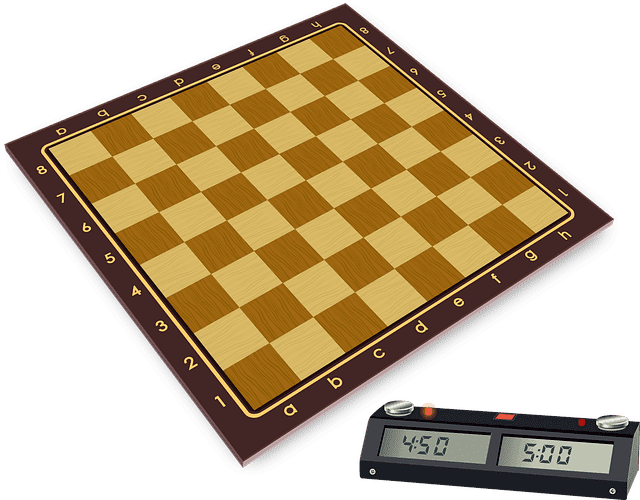
Chess clocks actually contain two clocks instead of one, where one stops while the other is on the run.
It is used to measure again, the player’s remaining time.
Over time, different models have been designed which are far different from each other.
Particularly there’s two, analog and digital.
Analog vs. Digital
The first thing to consider before making a purchase is what type of clock are we talking about?
An analog clock is a much more mechanical type of clock that exists in the early games of chess.
The first chess clock is an analog clock.
This tells you a lot of the age, which make this antique and authentic, but maybe a little bit outdated as well.
Let’s go over what you can find in this type of clock.
Analog Specifications
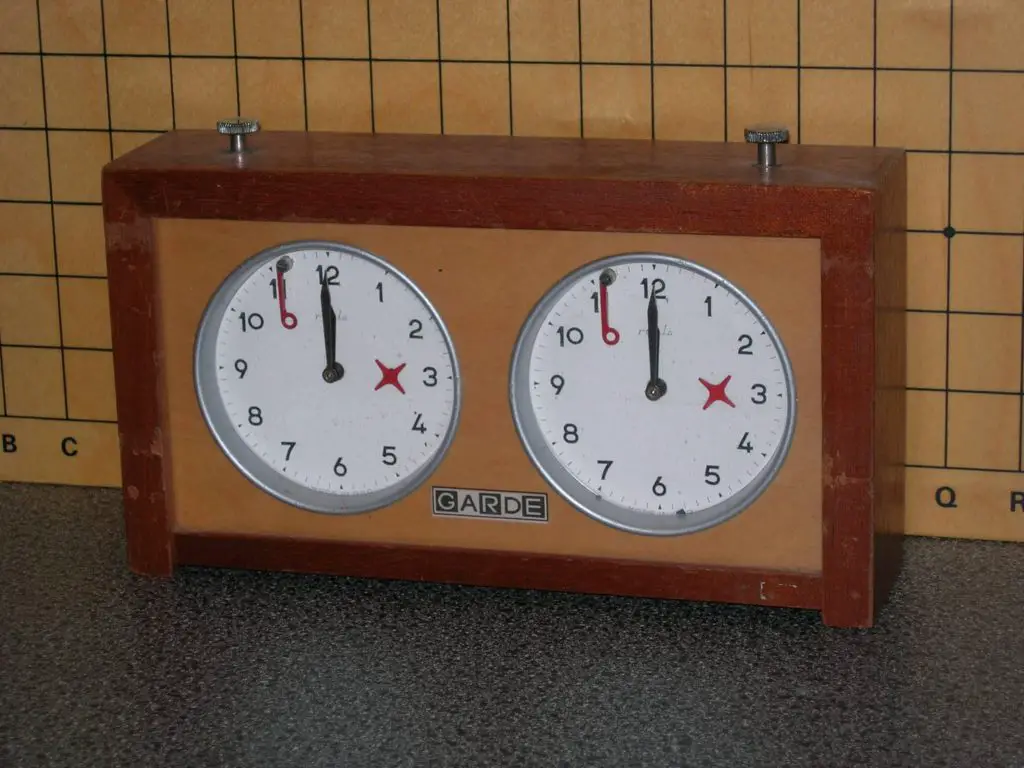
This is an analog clock, it is the earliest form of chess clock.
The analog clock has the following characteristics that allow it to monitor time:
a.) Hour clock
Unlike modern digital clocks (you know those things that tell us time by numbers), the timer on this thing is more like a wall clock.
The specific time is not expressed on the visual itself but needs further inspection to interpret the countdown.
Instead of numbers going up and down, there is a long hand and a shorthand (again, like a wall clock) in the center that moves over time.
Both players have a clock on each side where the one that doesn’t get to move have their time frozen, while the one making the move is on the run.
After the button is pushed, a mechanical gear shifts the focus to the other clock instead.
This makes it run indicating that it’s the other player’s time to move.
It’s a pretty interesting feature actually, even in today’s standards.
b.) Push Button
The clock comes only with the option of pushing a single button to switch turns.
This is a big contrast to the sliding design found in modern digital clocks which has its own advantages.
Fun fact: A push-button was used in my first tournament, it gave me an extra pressure since it’s kinda hard to press.
(Michael) Wegochess
The push button is a model that is currently used in major tournaments, and for a good reason. It has:
- Durability– a player in time trouble would be more likely to smash the button in a short amount of time; a reliable button then would be necessary to prevent the clock from malfunctioning during this critical time.
- Weight– Likewise, push buttons are made of heavy materials thanks to their mechanics, this prevents the clock from easily getting knocked over when the players get pressured.
If you expect this clock to last a long time, then it’s maybe better to invest in this design.
Especially in a competitive environment where the time can be a controversial issue when deciding the results.
c.) Winded / Battery
Some analog designs can actually be winded! meaning there’s a gear at the back which you can turn to make the clock move.
A battery is not necessary when using an analog clock, so if you’re the type that doesn’t like switching batteries then this is for you!
This has the following advantages:
● Again, completely removes the need for a scheduled replacement of batteries.
● Less reactive to shock and changing temperature which is potentially problematic for electronic-based materials.
● Some clocks only work on a specific type of battery that increases the hassle.
However, such a winding system which is made of metal also has its downsides:
● A bit more requiring since you need to actually turn the gear every time just to start the clock, which could be a task when dealing with multiple games.
● Although resistant to shock and temperature, this is really dangerous with water due to rusting effect.
● Makes the clock somewhat heavy and non-portable to some long-distance purposes (although doesn’t apply to lighter materials).
Take note however that an analog clock can still have batteries, you actually have the option whether to opt for one.
d.) Singular Format
Unlike the modern digital clock that has custom sets of time controls, the analog is much more singular.
Meaning there is only one way of calculating the player’s time, and that is whether the clock goes down.
Of course, the analog can still be played with blitz, classical, or any variety of time metrics, but a bit more problematic with delay and increments.
Necessary fact: an increment is an extra time granted to a player for every move made, in contrast to the delay which is the amount of time adjusted before the clock actually starts ticking.
Wegochess
This customizability makes the digital clock a more of an advanced one, having more fun time controls.
So if you’re one to test a lot of unique time setups, then maybe an analog clock is not for you.
e.) Flags
This is a funny one, but it’s also rare.
The earlier models of this clock actually feature a flag for both sides!
The flag can be inserted on either side of a clock used to represent which country a player belongs to.
The flag goes down through a mechanism when the clock runs out of time, signifying a defeat.
This is an awesome experience in my opinion since I mean, you got a freaking flag! How awesome is that?
It makes playing the game much more serious and authentic, but that’s just maybe on me.
We’ve talked about what makes an analog clock, It’s time to learn the why.
Why would we have to prefer this than a digital one? What makes it special?
Analog Benefits
An analog clock host variety of upsides, including:
a.) Display Value
In all models of almost antiquity, they offer a very unique value of display and prestige.
There are not a lot of analog clock being made in current times, and the time may come where there isn’t any available at all.
Now this is for a good reason since this is not the standard model used in a competitive environment.
But just the rarity, the fact that not a lot of people have it and will soon join the collector’s items makes it desirable.
If you’re looking for a clock that is less applicability and more for its appeal and beauty, then an analog clock is a way better option than the bland digital one.
b.) Ticking effect
Another would be what I call the ticking effect.
Primarily is an impact created by the actual design of the clock, which is a wall clock.
Personally, I have a harder time paying attention to the digital one even though it’s actually more accurate, as it doesn’t really help to bring urgency.
This makes beginners more susceptible to running up on time and ultimately losing games.
An analog clock would help to snap a player’s sense of danger since the actual time is not clearly expressed.
This seems counterintuitive, but it actually works.
A player will be more likely to think faster if the actual time left is non-apparent, he/she will start to make more swift moves due to the ticking sound of the clock.
c.) Unique Experience
Another that I really just didn’t get to express better is the experience!
It’s just really cool to play with an analog clock.
Not only does it’s own feature is not that much available today, but it also makes the game interesting.
Especially those flags holes! But okay, I mean even those are rare today.
But there are still other features that come along with it, like the wall clock and the winding mechanism.
Other clock owners just refer to the appeal as “authentic”.
Authentic is just another term to say that it’s feel good, so you might want to give this a try before it runs out of stock.
But I want to talk a little bit about that.
Analog Expiration
Analog clock is starting to head in the brink of extinction, where a time may come that this kind will become something similar to a heirloom passed through inheritance.
And this might not be a bad thing, since digital clocks are just way better in application.
Digital is basically just analog clock but better; it’s like an analog with special modifications.
Teaser: Remember those old expensive coins? they may worth a lot now, but there is a time where they were just, you know, coins.
Wegochess
The digital clock may offer better use, but it definitely makes the analog more of an antique, a collective item in other words.
After we’ve talked about the analog, it’s time to learn what’s actually a digital clock.
Digital Design
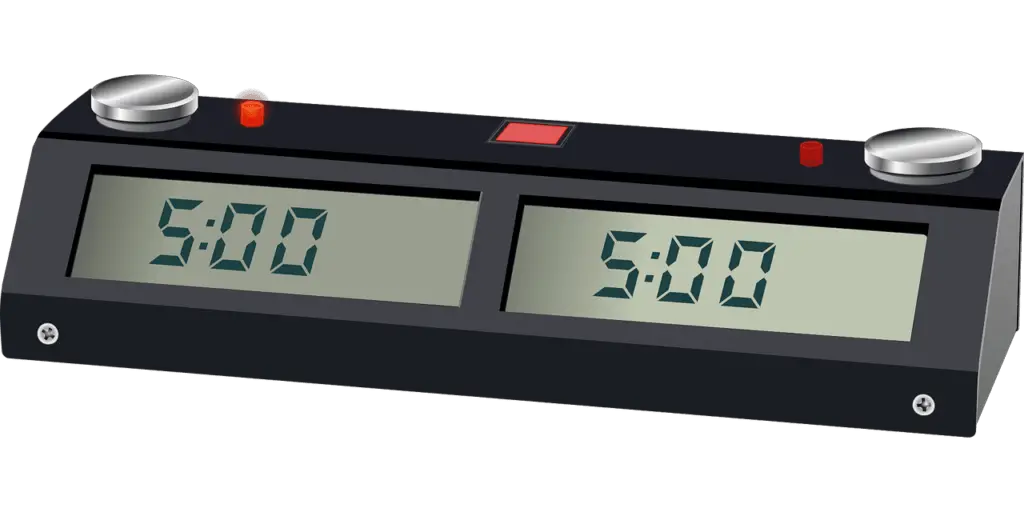
This is the second type of chess clock and may just be the best option if you’re seeking to utilize the function of time.
So, what’s in a digital clock? How does it differ from the analog?
Let’s talk about it a little bit:
a.) Metric Clock
The digital clock, unlike the analog one, has an embedded metric in contrast to the other which is a wall clock.
The number on this metric specifies the exact amount of time left, and even the delay and increment upon each move.
Preciseness is the name of the game for this design, and frankly the most important aspect of the entire thing in the first place.
This is why in almost every competition, the digital clock is the only clock you’ll see.
A player can accurately identify his/her remaining time by the very second, and this becomes even more important in faster time controls (blitz/bullet).
So if you’re in for the function and not the display part, then it’s maybe wise to choose the digital clock.
b.) Push Button/ Sliding type
We’ve already discussed the feature of a push-button design, It’s time to learn the sliding type.
It’s a button press that’s supposed to make the entire top as the area to be pushed instead of just a single button.
Again, the two strengths of a push-button type are the durability and weight, which is a great feature for a button.
The sliding one however also offers unique advantages:
● Visibility- a player especially a beginner, will be more likely to spot the area to be pushed since it’s just larger than a single button.
● Pressure- The sliding design doesn’t necessarily require to be exerted a lot of force, meaning you can move the thing with just a light touch.
These are all great characteristics, but we should take note that the digital can come with either the single button or the sliding design.
You could actually buy a digital clock with the single push button just like the analog!
You should choose the one that you prefer instead of just sticking to the push button.
c.) Battery only
Unlike the analog one, the digital can only be powered by a battery, hence why it is called digital.
And this may seem like a downside, but not really since the battery just makes it convenient for the user.
The winding (basically you turn a gear) has its advantages, but having batteries also have benefits on its own:
● Doesn’t require the user to exert any effort just to start the time every single game.
● Is much durable in the long run since there is no metal for the rust to accumulate.
● As per winding, the breakage of the gear meant the end for the clock, while a drained battery can always be replaced.
So don’t feel afraid to have a battery-run clock, the winding is actually cool (really cool) in my opinion but if you prefer this one then it should be fine.
d.) Custom Time Sets
And now this is the biggest reason why the digital is overtly better than the old analog design, the custom time sets!
With the feature to make increments and delays, it provides more flexibility for more competitive choices.
An increment is the amount of time added after every move, so for example 5 + 3 is 5 minutes per player where a bonus of 3 seconds is added after each turn.
Likewise, a delay is an opposite where a 5 minute with 3-second delay means that the clock won’t start after 3 seconds of the player’s turn.
This is something that is not available on the analog clock and seeing how increments and delays are becoming more significant it makes the analog kinda outdated.
There are other custom time controls that can be inserted in this clock, It’s up to your imagination.
Digital Perks
In the mechanical sense, digital is better than the analog clock.
The analog design has its advantages, but let’s look at what the digital one can bring.
a.) Precision
Due to the metric style of conveying time, the digital version takes the cake on accuracy.
And although the ticking effect (sense of urgency) can be useful on beginners, it really annoys advanced players that can incorporate the time in their game properly.
Less information just increases the likelihood of actually losing on time as you don’t actually know how fast the wall clock for example will burn time.
It gives:
● Correct assessment on how much time a player can hopefully afford before going zero.
● Removes the pressure of not knowing when the time will actually expire.
● Provides a clear comparison to how much time you have against your opponent.
Now, I still stand by my word and say that the analog clock is great for beginners.
But the precision is just helpful for more seasoned people.
b.) Delay and Increments
Again, the ability of the digital clock to make increments and delay alone makes it more valuable than the analog.
Of course the analog has its place to from its other features, but this inability alone makes it pretty limited in terms of use.
Most tournaments today are played with increments since it’s more practical to have an addition or delay than one continuous session.
This way, all the time are probably not going to be used therefore making games more quicker.
As buyers, being able to train with increments and delay is pretty important.
c.) Creative timed games
If you’re the funky type that likes to play with time formats then a digital clock is for you.
It gives the ability to create your own time sets that can be used to make creative formulas.
Such includes things like giving odds with time increment (one player has more time), or hourglass where time is loss for the one making the move while being added to the one who doesn’t.
A digital clock gives this power to go beyond the horizon from what is the traditional time usage.
Digital Revolution
Like all things, mechanical products from the past are starting to get replaced by new technologies.
The time will come where the analog is just a thing from the past, but may actually be a good thing.
Since functionality-wise, the digital clock is basically the analog but better.
However there is still room for antique forms, so if you’re looking for a display then go for the analog, for practical use, go the digital route.
Brand
There are many many reputable chess brands that supply these clocks, and you should find the one that puts accountability first.
These are the problems with online stores, since you may not get what you bargain for.
Here are some of the popular and trustworthy chess brands:
● Wholesale Chess
● House of Staunton
● ChessBazaar
● Uscfsales (U.S. based)
If you purchased through some local shops or online e-commerce then it’s fine, but these specialized companies will give the best quality for the buck.
They are after all are focused on selling chess products since their founding, and therefore good at doing so.
Material
Another consideration will be the material.
Chess clocks are mostly only made in three materials: plastic, wood, or metal, that offers unique advantages for each.
I say most of the time since there exist custom clocks that have their own unique material, but is pretty rare and kinda hard to find in the market.
A plastic clock has the following strengths:
● Lightweight, easy to store, and can be transferred much more conveniently than other materials.
● Cheaper than other options, but do the job just fine.
● Is not susceptible to rust and breakage although is less durable compared to metal for example.
As for wood, it has:
● Much more durable than plastic.
● Is slightly heavier therefore less vulnerable from being knocked away.
● Can do well in a change of temperature; cannot rust.
Lastly, choosing metal gives:
● The most durable of all three; last longer than any of the other three materials.
● Heaviest material; really hard to knock over.
● Can only be scratched; less likelihood of permanent damage.
The material heavenly affects the clock, so choose the right one for you!
Price
A standard clock cost around $15 as the cheapest, going up to several hundred for the most expensive.
The factor for price includes the actual design, whether it’s an analog clock which will be more expensive, and where you buy them.
This of course also includes the material, age of the clock, the specific model, or whether you are eligible for shipping.
Sometimes the extra cost is worth it if you’re going to get the desired experience it’s up to you to decide though.
But do you know that you can actually get the same features for free?
Enter the clocks for chess apps.
Chess apps
There are actually chess apps that you can download through your smartphone right now that has the same functionality as the actual chess clock.
Of course I still recommend an actual clock for competitive purposes (you can’t use a phone in tournaments), but sometimes we just want things for free.
And I’m just like that too, so unless you’re trying to get into one, then you might want to check this out.
General Chess Apps
There are tons and tons of available clocks for you to choose from even just typing in google.
Some have different functionalities and others have custom time sets too.
These allow players to use a clock without the cost of purchase from the physical thing.
If you can’t find it on google, then try play store and type chess clocks, read reviews and use them! they’re free.
However, there’s one in particular that I recommend the most.
Lichess
Lichess is a free to sign up chess medium like chess.com that hosts chess-related content and puzzles.
This is the best option when it comes to having the clock from an app, you could actually just go in their options to find what you’re looking for:
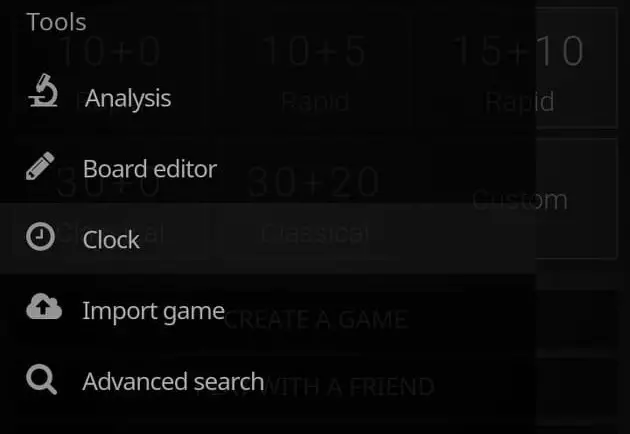
They got a variety of options that I think you would enjoy very well.
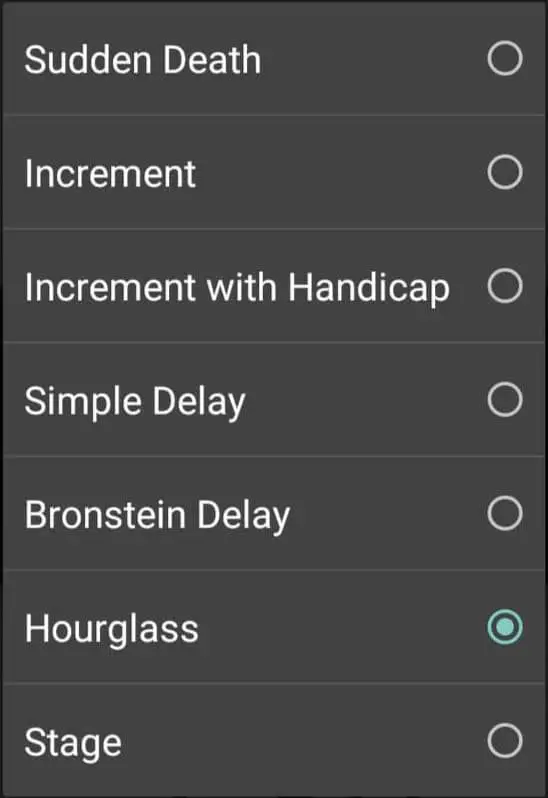
Chess.com does not have this feature unfortunately, so lichess beat them on this one.
If you don’t know chess.com yet, they are another fantastic platform and even better when it comes to training purposes.
They have online daily trainings, rush, and drills for free, it’d be a shame that they have not incorporated the clock set up though.
You should sign up for chess.com if you don’t have an account yet, it’s just awesome.
I’ll leave a link here (will open in a new tab) for you to sign up and start improving as soon as possible.
Closing statement
There are a variety of ways to choose your chess clock, whether it’ll be an analog digital, or even a downloadable app.
Physical clocks are great if you want to get used for playing with one before entering a formal competition, while the app is great if you’re into chess only by hobby.
Whatever is the purpose, it’s really important to learn playing the game on a countdown!
Since you would have do it anyway sooner or later anyway.
Sleep well and play chess.
